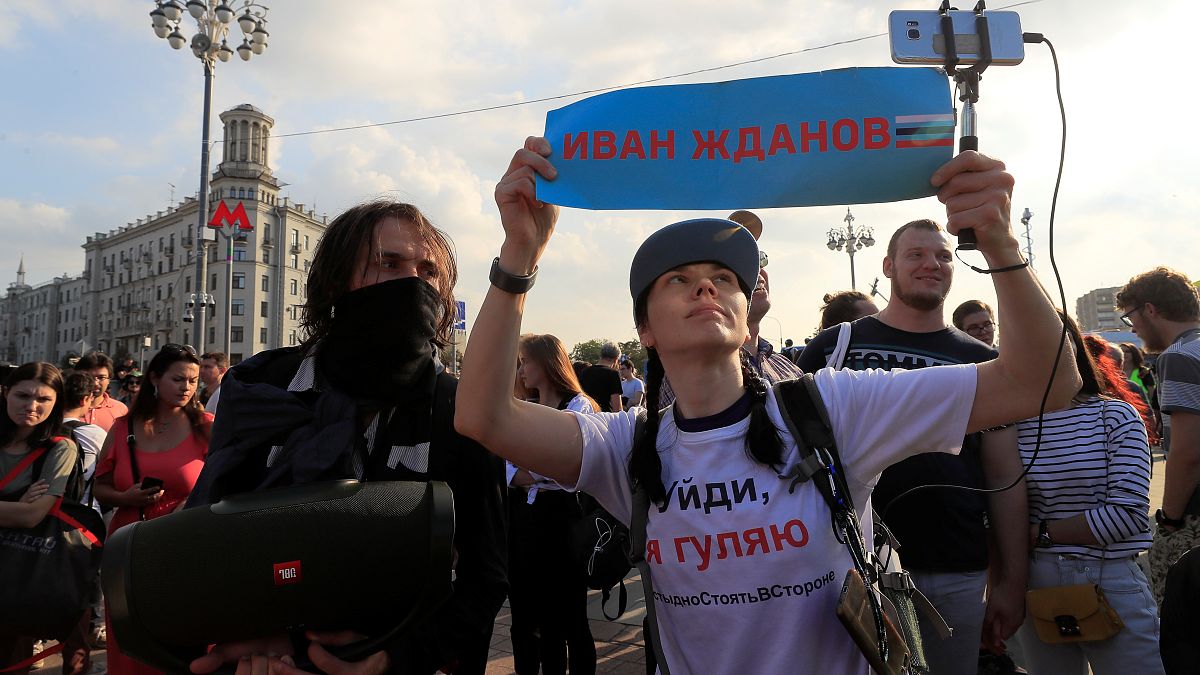In Moscow, all ruling party candidates are running as independents as its popularity wanes.
Russians will head to the polls on Sunday (September 8) for municipal and regional elections.
Under normal circumstances, such a local vote would have gone unnoticed by most Russians, blasé by the usual “elections without a choice”.
But this year, everything could be different. Euronews explains why.
A summer of protests
The vote in the Russian capital has already triggered weeks of protests after authorities refused to register a slew of opposition-minded candidates.
Election officials said the barred candidates had not collected enough genuine signatures to take part in Sunday's election, an allegation the candidates denied.
A single march on August 10 attracted around 60,000 people, which a monitoring group called the country’s biggest political protest for eight years.
Police have briefly detained over 2,000 people at this summer's protests in Moscow, with courts jailing some of those who took part for up to four years.
According to experts reached by Euronews, the authorities’ reactions, rather than the elections themselves, is what fuelled the protest movement.
“The point of the protests was not the elections but the illegal actions of authorities towards the protesters. I think that few people are interested in the elections themselves. But what happens to specific people - this can cause protests,” said Yuliy Nisnevich, a professor, doctor of political sciences.
The expert, however, noted that although the protests are growing, they still represent a small minority which may not affect President Vladimir Putin and his grip on power
According to Grigory Melkonyants, co-chairman of Golos elections watchdog, a protest spirit started to emerge as early as during the 2018 elections.
Even though Putin then won a landslide victory, runoff elections were held in several regions of the country because of the so-called protest vote. As a result, “unwanted” candidates unexpectedly came to power, the expert said.
“People begin to (...) believe in the power of their voices,” Melkonyants told Euronews.
“You understand that the authorities want to push a certain candidate, and you go and vote for another candidate. That’s the whole protest,” Melkonyants said.
The expert believes this trend will only intensify in the upcoming elections.
Ruling party absent in Moscow
Not only are many opposition candidates absent from the poll, but so will be the ruling party in Moscow.
United Russia has reached its lowest level of popularity in more than a decade, at just about 33%, according to official pollsters.
Therefore in Moscow, all of its candidates are running as independents, a tactic widely seen as aiming to prevent them from being damaged by the party's waning support.
The party has served as a lightning rod for public anger over a government move last year to hike the retirement age, a deeply unpopular reform that compounded growing dismay over five years of falling real incomes.
'Putin deficit'
Last year, Vladimir Putin entered his fourth presidential term with a record 76.69% vote share on a record turnout.
At well over 60%, Putin’s approval rating is still high compared with many other world leaders but is lower than it used to be.
Tatyana Stanovaya, a freelance expert at the Carnegie Moscow Centre, told Euronews:
“In the Kremlin, they still act on the basis of the old logic, the logic that prevailed until 2018, when everything was stable, predictable and it was possible to act within the framework of the previous strategy.”
“I think we can say that a ‘Putin deficit’ has developed within the country among the population. The Putin who was chosen in the 2000s is becoming a thing of the past, but the authorities are not creating a new alternative, interesting and attractive,” the expert continued.
“Putin wants everything to be predictable and manageable so that there are fewer conflicts, fewer ideological disputes (...)Therefore, all domestic policy is dying out, and security forces are increasingly engaged in it. It turns out that such a technocratic technique leads to an expanding political vacuum.”
Unpredictable voting results
Besides Moscow, other regions will be the focus of media attention.
The race for the governor's seat in Saint Petersburg has been among the most controversial.
Acting city chief Alexander Beglov is expected to win after his main competitor, Vladimir Bortko of the Communist Party, suddenly withdrew his candidacy a week before the vote.
“It is not clear whether Beglov will be able to win in the first round, although everything was done for this purpose. It would seem that some miracle would have to happen in order for him to lose,” Stanovaya told Euronews.
Fraud on election day is not a major concern, although it cannot be completely ruled out.
After the largest protests since the Soviet era were caused by mass fraud in the 2011 legislative elections, the Kremlin has taken action. Many polling stations are now equipped with cameras, while human rights defenders have the possibility to get in touch with electoral commissions.
“It is difficult to imagine how events will unfold in polling stations because there will most likely be a large protest vote. It is possible that in those places with little or no observers, there may be attempts to falsify or distort something,” Stanovaya said.
“Elections are a kind of sociological survey. If everything is properly calculated, without falsifications, they will allow one to take the temperature of society,” the expert added.
